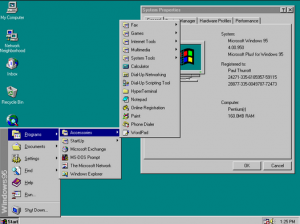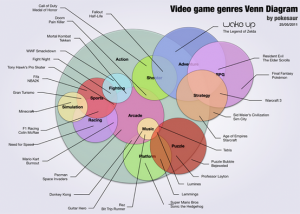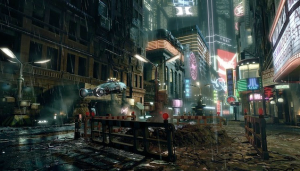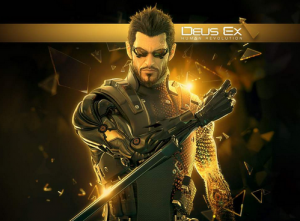Author: Zhan Wu
Abstract
The gaming market has been continuously spiking as computer and digital devices emerged around our lives from the 1980s till now. The exponential increase in video game companies has led to a boom in players as well. Video games, compared to its first emergence, seem to play a much bigger role in our lives now, and still little do we know about how such a potential medium could influence our thoughts.
This project aims to investigate the different genres of videos-games, such as action-adventure, role-playing (RPG), strategy games etc. and seeks to compare and contrast how these games, set in virtual (digital) worlds, subconsciously alter our perceptions and decision-making process in the real (physical) world. The project will first attempt to boldly recontextualize the setting, plot and characters in various games to illustrate the societal impact if people acted exactly like video game characters. Subsequently, to comprehensively and specifically discuss the impact of games in our lives, numerous attributes of games, such as linearity versus nonlinearity, sandbox versus just narrative, will be scrutinized. Game samples that are representative of each attribute will also be taken into account. By making these concrete analysis, the project attempts to ask the reader: How do different game genres and game styles change our perspectives in our real world?
Last but not least, the project seeks to research how subconscious perceptions of the physical world is different for a young person who is playing a game (controlling the protagonist and making the decisions) and for a relatively older person playing the game. To minimize error, the same part of a game (genre and attribute to be determined) will be presented to the player to play and remediated as a video for the “watcher” to watch. This interesting comparison will give us a glimpse about how interactivity/interpassivity of video games encompasses potential societal implications.
Computers and Gaming
The earliest computers comprised of basic processing units such as a CPU, RAM memory and GPU came in the dawn of the 1970s. By then, computers were, strictly, computers, or in other words, computational machines. They were typically an amalgamation of numerous hardware components that collectively made up the size of several rooms and were construed with thousands of transistors, resistive circuits, and operational amplifiers to carry out sophisticated matrical, differential and probabilistic calculations within the second. They were not the “computers” we see today.
Figure 1: Early Computational Machines [1]
Not yet.
The world saw a gargantuan revolution in the end of the 20th century, a change which even would have startled the polymath Charles Babbage if he only were still living in that generation. Hardware and software breakthroughs such as the mouse/keyboard, Apple OS 2.0, 3.0 and X as well as Windows 95, 98, 2000, and ME sprang up the horizon which changed the once pitch-black user operating software background to vivaciously colored images with a windowed user interface that was far friendlier than original DOS interface.
Figure 2: Windows 85 User Interface (Windowed Mode) [2]
Digital Entertainment
Probably one of the most notable and spectacular revolutions that accompanied such a huge revolution was the functional extension and re-definition of “digital entertainment”. This phrase, which once has been constrained to only the radio and television, was subsequently extended to personal computers by the creation of video games. Yes, video games, a means of entertainment that seemingly has become so popular and widespread nowadays people cannot realize anymore how “fresh” the concept was back in the 1980s. The word “game” itself is defined by Merriam-Webster dictionary as “a physical/ mental activity or contest that has rules that people do for pleasure…an activity engaged in for diversion and amusement.” [A] Computer games, needless to say, seamlessly suit this definition in terms of digital environments.
The developmental history of video games can be traced back to the multi-pixel games such as Pacman and Pong!. These games focused mainly on gameplay and did not emphasize other game elements we see equally as important today, such as a narrative story or good graphic elements. That was, however, also due to technological limitations and despite only having elementary graphics, these two games were a huge success in the United States.
Figure 3: Pacman and Pong!, the earliest computer games. [3]
With the widespread availability of video games nowadays, it is extremely important to assess the level in which video games have made an impact in people’s lives. particularly in the field of perception and decision making process. In this paper, I propose that video games do subconsciously alter our perceptions and decision-making processes in the real world, though the extent to which it does so depends on the game itself and the environment it intends to portray.
Game Types, Genres and Definitions
Throughout the evolution of the video game industry over twenty genres of video games have been classified. Despite the plenitude of game types, many genres bear similarities and thus we can categorize these genres into a few major categories. In analyzing the impact of video games in our daily decision making process and perception of our surroundings, we are particularly inclined to categorize computer games into four genres: action-adventure, roleplay (RPG), strategy, and board games.
Figure 4: Chart of Video Game Genres. [4]
Action-adventure (AA) types of games are, as the name suggests, a combination of action and adventure games. Adventure games customarily focus on solving puzzles in different gaming levels while action games majorly emphasize and rely on fast-paced actions and player reactions to accomplish certain tasks. The combination of such, which the video game industry saw as yet another potential route of gaming, resulted in many critically acclaimed games such as the Legend of Zelda and Metroid Prime series. Furthermore, role-play (RPG) games, on the other hand, do not necessarily have puzzles, but usually involve a player-controlled protagonist in the game who is involved in a narrative story. In the gaming era of the 21st century, we can clearly see that most action-adventure games are more or less comprised of of some representative elements found in RPG games, and vice versa. Grand Theft Auto (GTA), Assassin’s Creed, and Call Of Duty, for instance, can all be classified as both action-adventure and RPG games.
Figure 5: Assassin’s Creed 4 Black Flag as both RPG and Action-Adventure. [5]
Strategy and board games are much more different a genre than AA/RPG games. The most notable difference can be found in the player’s responsibility in the game. Action-adventure and RPG games typically require the player to follow a certain narrative plot to finish the game, whereas the player’s responsibility in strategy games such as Command and Conquer, and Rome Total War as well as traditional board games like chess and domino is to simply outwit the opponent in rounds of small time intervals. Thus, the very principle concept of strategy/board games is completely different than AA/RPG games and should also be considered as such.
Game Recontextualization
One crucial step when scrutinizing the influence of video games on personal perception and decision making is to go to the extreme end of the spectrum, that is, one inevitably has raised the question: What happens if we completely merge the real (physical) world environment, that is, the physical space we live in each day, with the principles and perceptions we find in video games and video game characters? For many people such an imaginary prospect would be very scary and grim, but also gripping simultaneously, and a comparison between our real society and the gaming environment helps reveal some of the ideas that game developers wanted us to consider. Since action-adventure games and RPG games have too many common gaming elements and principles and for the sake of conciseness and clarity, it is wise to put them together and envision a world where people would absolutely adhere to the gaming principles subject to the game environment. Indeed, McKenzie Wark, in his renowned book Gamer Theory, uncovers the significance of games in the gap between the near-perfection of actual games and the highly imperfect gamespace of everyday. He frequently makes comparisons between the gaming space/environment and our physical world and sometimes tends to eliminate the boundaries that sets them apart.
The type of gaming environment and social norms constructed in a game hinge on the settings and plot of that particular game. Action-adventure/RPG games can assume many different settings. In the Elder Scrolls: Skyrim assumes a medieval European atmosphere; Mario and Luigi World is set in an all-out utopia of the Mushroom Kingdom; Bioshock Infinite’s plot originates from the totalitarian societal “democracy” and floating city Columbia during the second Industrial Revolution in the 1890s. Assassin’s Creed 4 Blag Flag talks about the tales of a fictional pirate character Edward Kenway during the Golden Age of Piracy in the West Indies during the early 1700s; Grand Theft Auto IV’s story happens in the neighborhood of Liberty City, a fictional recreation of NYC, in 2007. With myriad gaming environments set in so many different time periods, it is oftentimes difficult to identify a common game environment that is representative of all others. Fortunately, most action-adventure/RPG games, including all the aforementioned, happen either in harmonized utopias or in dystopias fraught with violence, and it is the former of these two attributes of gaming environments that is heavily used by game developers as typical gaming environments.
Dystopia Explained
A dystopian society is, as most of us know from reading novels, a place where people have to live constantly in fear of an authoritarian or totalitarian regime. The gaming society is not a stranger when it comes to dystopias. Just as novels vividly depict these dark societies, so do games, with some games being representative in terms of this dominant attribute.
Figure 6: Depiction of a Dystopian Society. [6]
Deus Ex: Human Revolution is a classic example and a realistic construction of a dystopian society. The game is set in 2027 and delineates a world where biological prosthetics, such as limb augmentation and augmented reality devices has become the norm in people’s daily lives. The story revolves around Adam Jensen, who had to go through a life-saving surgical operation where all his limbs and organs were replaced by artificial augmentations due to a preconceived explosion of terrorists in his workplace Sarif Industries, responsible for constructing biomedical augmentation devices. His quest (and gameplay for the gamer) reveals the potential power and the illegal/violent atmosphere multinational corporations create if they have grown in power beyond the control of the national government. The gaming environment itself is surprising dark-themed: there is little sunlight due to the heavy pollution, and crime rates are extremely high both during the day and at night, resulting in cyborg police officers constantly patrolling the streets holding automatic assault rifles. Though the game is set in the future, there still will be a huge difference between the gaming environment and the real environment even if we arrive in 2027 in real time.
Figure 7: Deus Ex Human Revolution [7]
To start off, it is highly unlikely that ordinary citizens will be allowed to carry, let alone use, semi-automatic shotguns or machine guns in public streets without special permission from the local government. People’s interactions would also be much nicer in real life than in the game, where all non-playable characters are suspicious of each others motives. Last but not least, the game’s depiction of Detroit city is highly unrealistic since the player can’t see the sky at any point when looking up during the game. Despite that being said, all visual representations in the game helps to reinforce the notion that the game is placed in a dystopian society and that people will act according to dystopian principles. Of course, such a dystopian depiction of a society is still inconceivable by most people and acts as a precaution to our current actions in the environment. Therefore, it could be argued that dystopian video games act as an impetus to more environmentally friendlier and more humanistic decisions by people who have played such games.
Figure 8: Gaming environment in Deus Ex Human Revolution and Dystopian Atmosphere. [8]
Experiment
It is to our interest to delve into the process of decision making in terms of the gamer compared to a person that merely watches a game. Are the perceptions and decision making process different between these two subjects? A practical implementation to explore this question is to establish an experiment in which people from diverse backgrounds will participate.
Six people of different ethnicities will be divided into three groups. (2 Caucasian, 2 Black, 2 Asian), with two persons in each group being in the current generation [1980~2000] and the other person of the previous generation [1960~1980]. One person in each group plays a game while the two other people watch for an hour. All people are then asked to answer a questionnaire at the end of the experiment.
http://www.youtube.com/watch?v=QGdew083mJ0&feature=youtu.be
The video above shows results of the experiment in terms of moral decision making. One result that was very startling was that ethnicity apparently didn’t play a role in video-game decision making, but age did quite obviously. Also, the questionnaire involved a mental rotation exercise, a color identification exercise, and a tracking exercise to determine the ability and speed of different people in the experiment to make rational decisions, resolve conflict, and track objects. It was seem from the results that people who actually played action-packed video games, such as Call of Duty: Modern Warfare and Grand Theft Auto, possessed higher mental readiness for decision-making as well as greater capabilities in resolving color conflicts.
Conclusion
Gaming nowadays has become one of the most indispensable parts of our lives. From the day the computer was invented, it has influenced subsequent generations and has altered many people’s perceptions of our real world. Although the extent to which video games influence our lives is different from person to person, we can say with absolute certainty that based on our analysis and conducted experiments above, gaming subtlety but surely changes and challenges our decision-making process.
Works Cited
Text:
[A] Merriam Webster Online Dictionary. http://www.merriam-webster.com/dictionary/game. Accessed Dec. 7, 2013.
Pictures and Plots:
[1] What would the World be Like If Steve Jobs Had Never Existed?, EXTREMETECH, http://www.extremetech.com/computing/98791-what-would-the-world-be-like-if-steve-jobs-had-never-existed. Accessed November 29, 2013.
[2] Microsoft 95 Was Microsoft’s Moment of Victory. Softpedia. http://news.softpedia.com/newsImage/Windows-95-Was-Microsoft-s-Moment-of-History-370153-2.gif/. Accessed November 29, 2013.
[3] Gigi- Our Original Gamer- Pacman. http://news.softpedia.com/newsImage/Windows-95-Was-Microsoft-s-Moment-of-History-370153-2.gif/. Accessed November 30, 2013.
[4] Game Theory: Video Game Genres Venn Diagram. Pokesaur. http://pokesaur.wordpress.com/. Accessed Nov. 29, 2013.
[5] Assassin’s Creed 4: Blag Flag Review – Swashbuckling Fun. The EffectNet. http://www.theeffect.net/2013/11/06/assassins-creed-4-black-flag-review/. Accessed Nov. 27, 2013.
[6] Nine Must-Read Dystopian Novels. WIREDCOSMOS. http://wiredcosmos.com/2012/05/23/nine-must-read-dystopian-novels/. Accessed November 29, 2013.
[7] Deus Ex Human Revolution Review – Immersive Gaming At Its Best. Game Insider. http://game-insider.com/2011/08/30/deus-ex-human-revolution-review-immersive-gaming-at-its-best/. Accessed Nov. 28, 2013.
[8] Deus Ex Human Revolution PC Review. Brash Games. http://www.brashgames.co.uk/2011/09/18/deus-ex-human-revolution-pc-review/. Accessed November 28, 2013.








